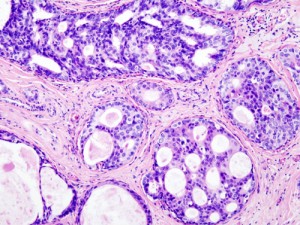October 16th, 2011 by Elaine Schattner, M.D. in Research
No Comments »


Ductal Carcinoma in Situ (DCIS) in the breast, histopathology w/ hematoxylin & eosin stain, Wiki-Commons image
More, a magazine “for women of style & substance,” has an unusually thorough, now-available article by Nancy F. Smith in its September issue on A Breast Cancer You May Not Need to Treat.
The article’s subject is DCIS (Ductal Carcinoma in Situ). This non-invasive, “Stage 0” malignancy of the breast has shot up in reported incidence over the past two decades. It’s one of the so-called slow-growing tumors detected by mammography; a woman can have DCIS without a mass or invasive breast cancer.
While some people with this diagnosis choose to have surgery, radiation or hormonal treatments, others opt for a watchful waiting strategy. The article quotes several physicians, including oncologists, who consider Read more »
*This blog post was originally published at Medical Lessons*
May 6th, 2010 by David H. Gorski, M.D., Ph.D. in Better Health Network, Health Policy, Opinion, Quackery Exposed, Research, True Stories
No Comments »

[Recently] I participated in a panel discussion at the Northeast Conference of Science and Skepticism (NECSS) with John Snyder, Kimball Atwood, and Steve Novella, who also reported on the conference. What I mentioned to some of the attendees is that I had managed to combine NECSS with a yearly ritual that I seldom miss, namely the yearly meeting of the American Association for Cancer Research (AACR) meeting.
There are two huge cancer meetings every year — AACR and the annual meeting of the American Society for Clinical Oncology (ASCO). AACR is the meeting dedicated to basic and translational research. ASCO, as the word “clinical” in its name implies, is devoted mainly to clinical research.
Personally, being a translational researcher myself and a surgeon, I tend to prefer the AACR meeting over ASCO, not because ASCO isn’t valuable, but mainly because ASCO tends to be devoted mostly to medical oncology and chemotherapy, which are not what I do as a surgeon. Each meeting draws between 10,000 to 15,000 or even more clinicians and researchers dedicated to the eradication of cancer. Read more »
*This blog post was originally published at Science-Based Medicine*













